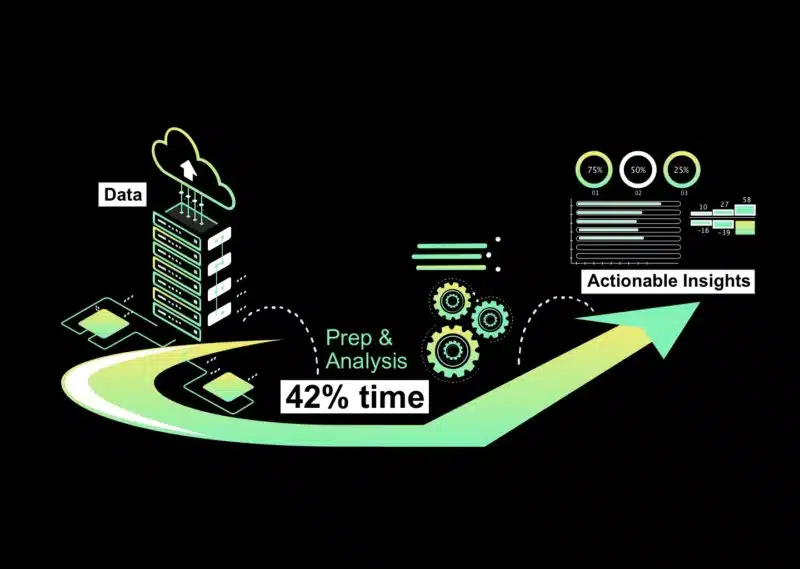Opinions expressed in this article are those of the sponsor. MarTech neither confirms nor disputes any of the conclusions presented below.
The top 4 data issues campaign managers face and how to solve them
Enable your marketing teams to be agile enough to react to real-time insights.

Data remains one of the most powerful assets in business. Those who know how to leverage it can execute data-driven campaigns with purpose, precision, and laser vision. And those who don’t are likely to have rudderless marketing campaigns that struggle to stay afloat.
The reality is that businesses are amassing more data than ever before. The landscape has changed, and customers today are in a noisy den of marketers, each working tirelessly to grab their attention. To get your message heard above the ear-splitting barrage, your marketing campaigns must be data-driven.
However, being able to dissect and analyze data is complex. It burdens campaign managers with a whole range of challenges that prevent them from harnessing the full potential of key insights. Below we’ll uncover the biggest problems data campaign managers face in today’s digi-sphere, along with solutions to overcome them.
Problem #1: Data analysis is time-consuming
Data has become the lifeblood of many businesses. The desire to extract more has led to marketing teams drowning in it, posing a significant problem – the more data you consume, the more you must analyze.
Having to critique reams of data that are scattered across different platforms is incredibly time-consuming. But this is often made worse by following inefficient processes that are carried out by inexperienced employees, which blights a company’s ability to leverage insights and take advantage of new opportunities. In today’s world, businesses compete in a fast-paced environment where fresh data can become stale very quickly.
Last week’s insights may now be past their sell-by-date, providing you with inaccurate data that will hamper the quality of your decision-making. Data analysis must be efficient to enable companies to pivot between different strategies and capitalize on real-time opportunities. Businesses must be nimble, not cumbersome.
Yet 42% of data workers’ time is being wasted on the analytics process, with 22% of these workers having a lack of understanding of analytics and data science (Alteryx, 2019).

Solution: Hiring specialists who know exactly how to interpret and make sense of analytics is one solution but not always a viable one. As you’d expect, many businesses may not have the budget to recruit data experts.
However, creating processes that can clean and organize data efficiently is an alternative that all businesses can turn to. Investing in software that organizes data in a way that liberates analysts from having to dig for key insights will make analysis more efficient.
Problem #2: Data analysis is expensive

Marketing tools remain the crux of any advanced campaign analytics. They provide the x-ray vision needed to see through the data clutter and measure performance. However, software can be expensive, and with the increasing pressure to provide cutting-edge analysis, even the most hardened of marketing managers will feel a pang of anxiety.
The reality is that many businesses don’t have the budget to invest in state-of-the-art software that can analyze the treasure trove of data they’ve gathered. According to a study by SQream, only 13% of businesses were in a strong financial position when it came to supporting data analytics activities.
To compound things even further, despite 83% of companies stating that they were prepared to manage and analyze data, 87% reported that their budgets weren’t enough to cover their data analytics needs.
Software that’s incapable of producing accurate data analytics will paint a false picture of the landscape you’re competing in. This, of course, has its own perils, which begin from feeding decision-makers with incorrect information and ending with customer-alienation.
Cheaper alternatives, such as excel, also provide simpler solutions that may be beneficial in the short term, but in the long run, may snowball into something more problematic. Managing this sheet requires regular updates to ensure that data is fresh. Then, as the company grows, this might expand to two Excel sheets that somehow need to be linked together. Over time the data becomes so complicated that only one person can make use of them.
Time is wasted. Data becomes disconnected and errors accumulate. Can you see where this is going?
Solution: One way to overcome this is to request an increase in budget by illustrating the ROI of what an analytics system can bring to the company. A clear demonstration of its benefits along with the pitfalls will create a compelling argument that’ll be hard to ignore, especially given that our global spending on big data analytics has reached $2 billion.
Problem #3: Data-fragmentation across platforms
Imagine being at the helm of several marketing campaigns where your team cast the net far and wide to capture fresh data through PPC, SEO, Facebook Ads, and email marketing. After a while, you pull everything back in to analyze the cluster of data silos that come from each campaign.
Keyword rankings, click-through rates, conversions, impressions, backlinks, open rates – everything is very granular. Of course, specificity always trumps ambiguity, but these nuggets of detail don’t provide a single overview of your performance. So, you’re left with scattered shards of data that can’t give you a clear illustration of your overall marketing performance.
This is data fragmentation – and it’s a hazard that hits businesses of all sizes. Marketing managers need to have holistic insights at their fingertips to demonstrate accountability for their marketing budgets, make quick adjustments to their current strategy, and, if need be, pivot to a new one altogether.
Yet, at the heart of the problem is the need to create a coherent and bespoke data schema across all applications. Each application that you leverage uses its own data schema to help visualize your performance.
So if you use Google Ads, Google Analytics, HubSpot, Marketo and ten other applications to manage your digital marketing campaigns, they’ll all use different metric naming conventions as part of their tracking.
The real challenge is to create a consistent target data schema, where everything is stored in one place to allow managers to analyze and develop an understanding of whether their efforts are bringing them closer to their goals.
Failing to find a solution to this problem will force businesses to trudge through the mud until they can make sense of their data, which at this point may already be out of date.
Solution: Data that can be pulled automatically into one place will save you time, minimize errors and allow you to harness the full potential of real-time insights. A simple yet effective solution would be to invest in a powerful marketing dashboard that unifies all data in one location.
Looking into the nuts and bolts of it, managers require three key components for any solution to come to fruition:
- ETL / data integration: to pull data across disparate platforms into one place
- Powerful data-warehouse: to prepare and organize the data that’s been gathered from the first step
- Analysis & visualization: to tell the story behind the numbers and derive actionable insights
Doing so will automate insights and allow you to gain a quick yet comprehensive overview of your campaign performance.
Problem #4: Building and maintaining reporting structures is time-consuming

Marketing reports are snapshots of your business, and they’re indispensable to any firm looking to compete in today’s digital playground. Their insights help to make sense of your data, highlighting what’s working and what isn’t… that is, of course, assuming that all your data is up to date, accurate and includes the appropriate metrics to measure your performance.
The truth is reporting can be a headache for campaign managers. Many companies dread monthly internal reporting because of the time it takes to manually pull and process mountains of data across different platforms into something comprehensible. Being both tedious and error-prone, the entire process can be just as stressful as it is time-consuming. A single misplaced digit will send a ripple of miscalculation throughout the entire report, which will have an overall impact on performance and predictions.
Staff will then have to spend additional time digging through reports to identify and rectify mistakes, forcing other important tasks to be put on hold. Having this occur once is damaging enough but over time will drain company resources and suppress its ability to make progress.
Solution: There’s a ton of software that can do all the heavy lifting for you when it comes to reports. The problem is identifying tools that are cost-effective and competent. Arena Calibrate is one tool that ticks both boxes by being able to pull scattered data silos into one place and provide summaries of your performance across all channels.
Final thoughts
Undoubtedly, data is the latest craze that’s seized the attention of every competitive business on the planet. It’s an asset that can bring just as many problems as benefits to campaign managers who don’t know how to capitalize on it.
However, despite the challenges these obstacles pose, most of them boil down to a lack of organization and inefficient processes. The integration of software along with a more streamlined data analytics approach will make marketing teams agile enough to react to real-time insights. Doing so will enable managers to drive forward accurate and data-led marketing campaigns that can provide them with a competitive advantage.
Related stories
New on MarTech
